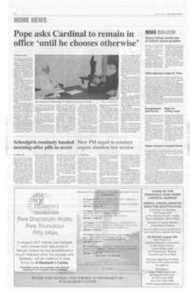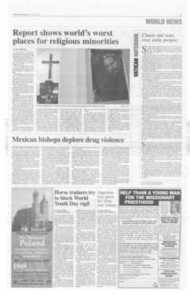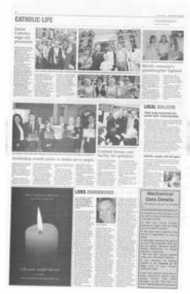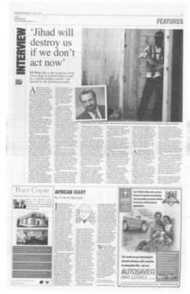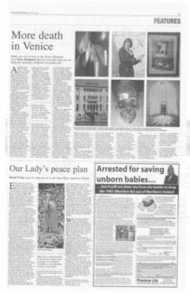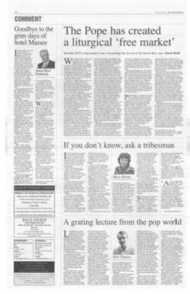Page 11, 13th July 2007
Page 11

Report an error
Noticed an error on this page?If you've noticed an error in this article please click here to report it.
Tags
Share
Related articles
Cdf Given Task Of Reconciling The Lefebvrists
Benedict Xvi Has Removed The Raison D'être Of The Sspx
Pope Liberates The Traditional Mass
Archbishop In Row Over Pope's Motu Proprio
Cardinal: Bishops Must Be Consulted Over Mass
Benedict XVI's Letter will enrich the whole Church
With one bound, they were free. In his wonderful Apostolic Letter Summorum Pontificum, published on Saturday, Pope Benedict abolished almost every restriction on bishops, priests and faithful who wish to celebrate the pre-Vatican II liturgy. For nearly 40 years, Catholics who adhered to the "Tridentine Rite" — as it will no longer be called — were treated by the Church as sensitive and difficult souls for whom special provision had to be made because they could not come to terms with the modern world. And, to be honest, there was more than a grain of truth in this description. But the wider assumption on which it was based — that the traditional Missal had been superseded by the Novus Ordo because the latter reflected the development of doctrine inspired by Vatican II — was always questionable. Indeed, as Pope Benedict makes clear in Summorum Pontificum, it is wrong.
The-Holy Father's motu proprio is not, as some commentators claimed this week, an experiment. It is a desperately needed clarification of the nature of the Roman Rite that demolishes the lazy and prejudiced assumptions of both "liberal" and "traditionalist" Catholics. Let us consider a couple of words and phrases that we should no longer use — that have been superseded by Summorum Pontificum or should never have been employed in the first place.
Tridentine Mass: The traditional form of the Roman Rite that the Pope affirmed on Saturday was in use in western Europe throughout the Middle Ages, though its central prayers are much older. Pope St Pius V codified the liturgy, removing many late-medieval accretions. His reforms, enshrined in the Missal of 1570, were inspired by the Council of Trent. But that Missal was itself reformed several times, culminating in the Missal of Blessed Pope John VUII of 1962. And that is the Missal which has been restored to its full dignity by the Apostolic Letter.
Old Rite/New Rite: Everything about these terms is unsatisfactory. The 1970 Missal is newer than the 1962 Missal only in one sense; in fact, the Mass of Paul VI incorporates a Second Eucharistic Prayer that is based on an older text than the Roman canon. It is not "trendy" and it is not a Mass created in the 1960s. (Some scholars argue that it is strongly influenced by French liturgies of the late 18th century.) Moreover, the Missals of Pope John XXLII and Pope Paul VI do not belong to separate rites. They are different expressions of the Roman Rite, just as there are different expressions of the Byzantine Rite.
Traditionalists and liberals: This may be wishful thinking on our part, but if the message of Summorum Pontificum is truly absorbed, then the Church will achieve a unity that has eluded it since the adoption of the vernacular Mass in 1970. The Missal of 1962 inspired the Second Vatican Council and was celebrated durings its sessions. The Missal of 1970 was inspired by the Council's deliberations, though it was not a direct product of the Council: Pope Paul promulgated it himself.
Celebrations of both forms of the Roman Rite should be enriched by the great teaching documents of the Council. Devotees of the 1962 Missal are understandably thrilled that Pope Benedict has restored their sacramental liturgies to their rightful position of honour and dignity: the traditional services now enjoy full parity with the Missal of 1970, even if the latter remains the "ordinary", as opposed to the "extraordinary", form of the liturgy. But Catholics who attend 1962 services must show that they are grateful for the gift of the Holy Father's motu proprio; and the way to achieve that is to show that their presence in parishes is not divisive. We would like to see responsible bodies such as the Latin Mass Society negotiating on behalf of their members; parish priests have a hard enough time fulfilling their normal duties without facing angry demands from people who may not understand the fine print of the motu proprio.
It goes without saying that the bishops of England and Wales bear a heavy responsibility to ensure that public Sunday celebrations of the 1962 Missal take place wherever there is demand for them. As the Pope observes, many young people are drawn to the traditional Mass; let the bishops seize this marvellous opportunity for evangelisation and revival.
Catholics who attend 1962 services must show their gratitude to the Holy Father by not being a divisive presence in parishes
blog comments powered by Disqus





